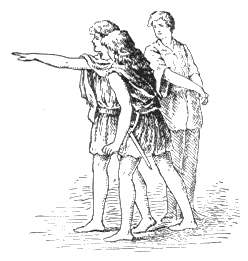

Oberon and Titania, who might have been as happy as the days were long, had thrown away all their joy in a foolish quarrel. Now fairies are very wise people, but now and then they can be quite as foolish as mortal folk.

Now this wood where Lysander was to meet Hermia, and where the other two had decided to follow them, was full of fairies, as most woods are, if one only had the eyes to see them, and in this wood on this night were the King and Queen of the fairies, Oberon and Titania. So she went to him, and betrayed her friend's secret. She knew that if she told Demetrius that Hermia was going, as she was, to the wood outside Athens, he would follow her, "and I can follow him, and at least I shall see him," she said to herself. Helena had been Demetrius' sweetheart long before his marriage with Hermia had been thought of, and being very silly, like all jealous people, she could not see that it was not poor Hermia's fault that Demetrius wished to marry her instead of his own lady, Helena.

But before she started, she told her friend, Helena, what she was going to do. Lysander of course was nearly mad with grief, and the best thing to do seemed to him for Hermia to run away to his aunt's house at a place beyond the reach of that cruel law and there he would come to her and marry her. The Duke gave her four days to think about it, and, at the end of that time, if she still refused to marry Demetrius, she would have to die. Hermia's father was so angry with her for refusing to do as he wished, that he actually brought her before the Duke of Athens to ask that she might be killed, if she still refused to obey him. Now, in Athens, where they lived, there was a wicked law, by which any girl who refused to marry according to her father's wishes, might be put to death.

Hermia and Lysander were lovers but Hermia's father wished her to marry another man, named Demetrius.


 0 kommentar(er)
0 kommentar(er)
